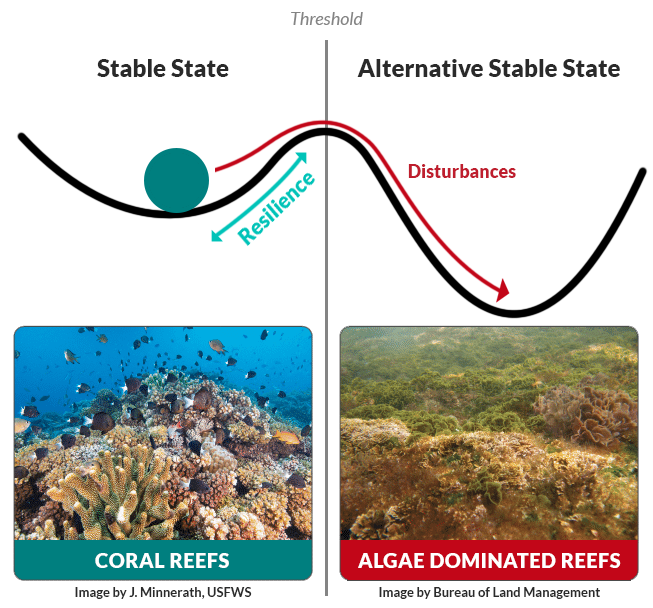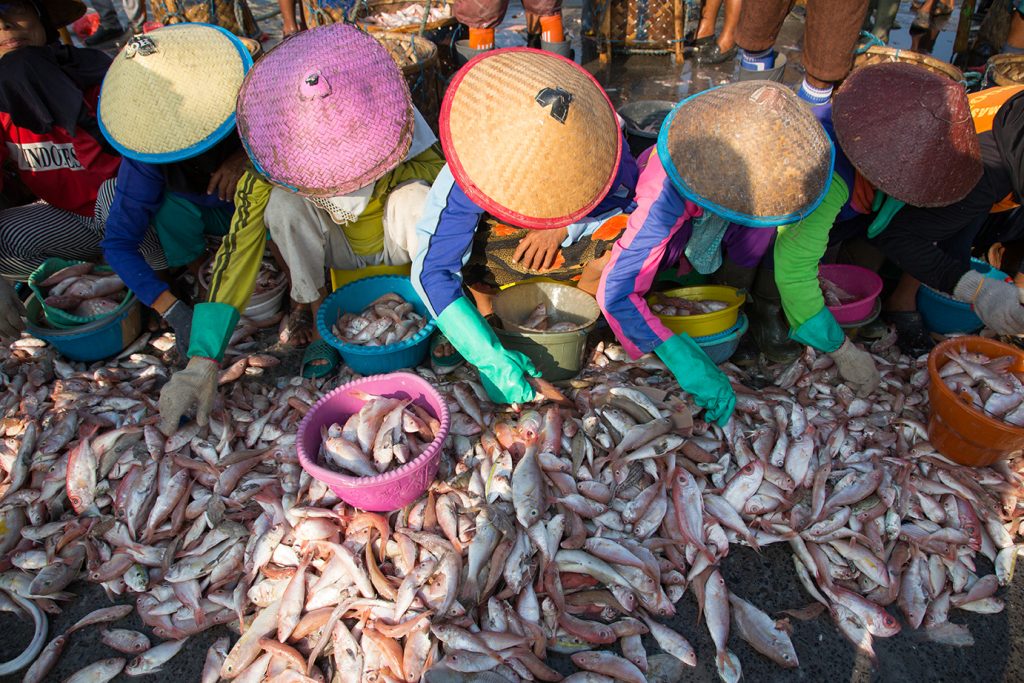What is Resilience?
Resilience is defined as the ability of a system to maintain key functions and processes in the face of stresses or pressures by resisting to and then recovering from or adapting to change. ref It can be applied to both ecological systems, and social systems (e.g., human communities). It can also be applied to the systems that communities depend on, such as economic systems that sustain livelihoods, governance systems that undertake planning and management, or the built environment (e.g., infrastructure and housing).
Three Components of Resilience
Resilience includes three components:
- resistance
- recovery
- transformation
Resistance refers to the ability of a system to tolerate impacts, while recovery refers to the ability of a system to bounce back. Transformation is the ability of a system to adapt to change, preserving key functions and processes. ref
Social-ecological Resilience
Resilience is a key concept for understanding how coral reef social-ecological systems may persist despite local disturbances and global climate change threats. ref The concept of resilience is relevant to understanding how coral reef social-ecological systems may persist despite local disturbances and threats from global climate change.
Three Dimensions of Reef Resilience
Reef resilience can be influenced by the coral reef, the individuals and communities that depend on it, and their management systems. Managing for coral reef resilience requires planning across three dimensions: ecosystem, community, and governance.
The ecosystem dimension encompasses the broader reef ecosystem, associated habitats (e.g., seagrass, mangroves), and the watershed that feeds into and impacts the reef.
The community dimension encompasses all the stakeholders that are dependent on the reef for livelihoods, cultural values, and health benefits (e.g., fishermen, Indigenous Peoples and local communities, or non-governmental organizations).
The governance dimension focuses on the organizational structure that surrounds the reef ecosystem and its communities.
Ecological Resilience
Ecological resilience refers to the ability of an ecosystem, such as a coral reef, to maintain key functions and processes in the face of stresses or pressures, by resisting and then adapting to change. ref Resilient ecosystems are characterized as adaptable, flexible, and able to deal with change and uncertainty, without switching to alternate stable states. ref For example, a resilient coral reef system is able to absorb threats without permanently switching to an algae-dominated state. ref

Conceptual resilience model for coral reefs adapted from Ken Anthony. Source: atlas.org.au
Social Resilience
Social resilience is defined as the ability of a human community to cope with and adapt to threats such as social, political, environmental, or economic change. Resilient communities are better equipped to cope with change and uncertainty which enables them to take proactive measures to secure their future. It is important for managers to work with reef-dependent communities and understand their vulnerability to changes in reef condition and to support adaptation efforts. ref

Sorting fish at the Brontong fish market in Indonesia. Photo © Ed Wray
Social vulnerability is a measure of the ability of human communities to withstand shocks and stresses to livelihood and wellbeing and is key to assess social resilience. Vulnerability includes the following components: ref
- Exposure: degree to which communities are affected by change (e.g., exposure of communities to disturbances that threaten their livelihoods or use of reef resources)
- Sensitivity: dependency of a community and individuals on reef resources (e.g., livelihoods solely associated with fishing or tourism)
- Adaptive capacity: ability to convert resources (including financial, natural, human, social, and physical) to respond to disturbance and change
Exposure and sensitivity determine the potential impact that a system could experience. Adaptive capacity is the community’s ability to moderate potential impacts. All these factors determine total vulnerability.
Governance Systems that Support Resilience
Governance includes policies, practices, rules, and regulations that establish responsibilities and accountability for communities and decision-makers in relation to the reef system.
Socio-ecological systems are more resilient when the governance systems that oversee them are transparent and accountable, and when they are trusted and knowledgeable. When the governance dimension is weak, or lacking in these attributes, it is less effective at helping socio-ecological systems rebound after a shock (e.g., hurricane, bleaching event) or overcome chronic stresses (e.g., sea level rise, economic downturns). When governance is strong, it is better able to support adaptation and recovery.
